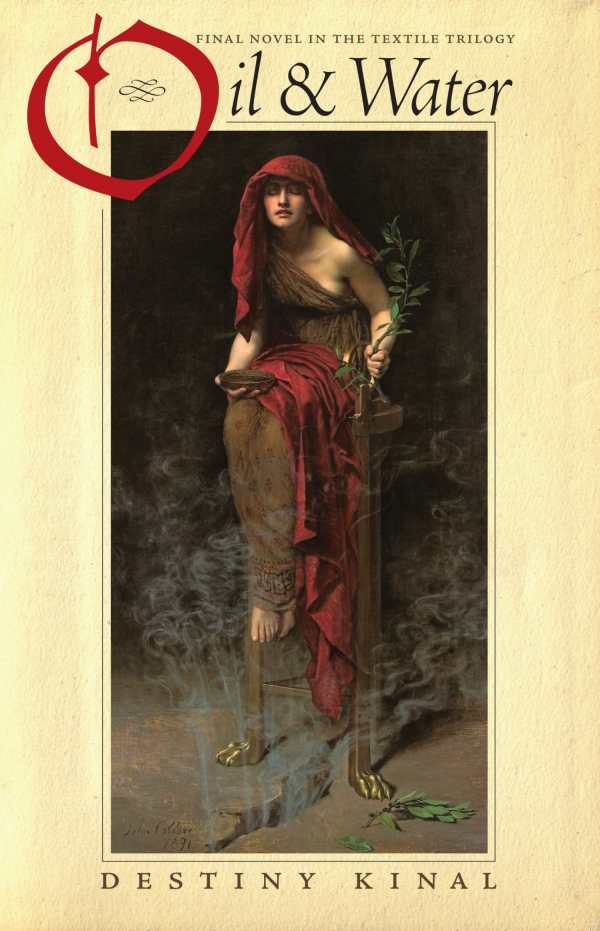
Oil and Water
Final Novel in The Textile Trilogy
Oil & Water is a thoughtful feminist novel in which an intellectually hungry young scholar comes into her own.
In Destiny Kinal’s speculative historical novel Oil & Water, women set out in search of the mythical cave of the Oracle of Delphi.
In 1892, Phaedra and Sarah, her New York–based bluestocking research assistant and lover, set sail on the Aegean Sea. Phaedra is a brilliant scholar who’s consumed by ambition; she wants to publish on the Eleusinian Mysteries before another scholar can. But that competitiveness takes over until she becomes an academic stereotype, even overriding other women in conversation. Sarah herself, meanwhile, is an intellectual who’s also in thrall to her senses. In the oracle’s cave, Sarah falls into a trance, receives prophesies, and resolves to devote herself to drawing and painting
When Phaedra discards Sarah for another woman, Sarah flees. On a different ship, enraged and mourning, she tosses their research notes into the waves; it does not immediately occur to her that Phaedra might retaliate for this act of destruction. And later, while she’s in the Azores, her curiosity about wise women’s traditions grows; she sets out to learn more about women’s mystical powers throughout history, traveling around the globe to do so. She makes stops in the Caribbean and in Scotland before returning home.
Split into four parts that cover separate eras and geographies in Sarah’s life, the book is made up of intertwined but discrete adventures that can stand alone. Each storyline is driven by Sarah’s fear and curiosity; read together, they ably reveal her developing dedication to her art. Indeed, she is driven to describe nature and artifacts in detail, for example musing over a “stinging iridescent blue sequin on an electric string” in the sea; while drawing a woman, she engages in a flurry of erasures to make the subject look as if she’s in flight. Some of her descriptions are quite ornate, but she’s still a rhythmic and engaging narrator. However, some threads—including Sarah’s fear of being pursued by Phaedra and, later, by an androgynous Cuban sea deity, Olokun—are dropped for long enough to be obscured behind the novel’s rush of new places, faces, and challenges.
The historical setting also ties into the book’s larger themes. The women set sail during the Industrial Revolution; when Sarah returns home, the air is thick with petroleum courtesy of the oil wells drilled in her absence. She is disgusted by the devastation that she observes, leading to explicit considerations of ecofeminism on top of the novel’s other concerns. While the topic is made to tie into Sarah’s self-realization through art and women’s spirituality, its addition is somewhat awkward, in particular because of its late arrival in the tale.
In the revealing historical novel Oil & Water, a scholar becomes enraptured with matrilineal history, comes into her own, and begins to envision alternative futures.
Reviewed by
Michele Sharpe
Disclosure: This article is not an endorsement, but a review. The publisher of this book provided free copies of the book and paid a small fee to have their book reviewed by a professional reviewer. Foreword Reviews and Clarion Reviews make no guarantee that the publisher will receive a positive review. Foreword Magazine, Inc. is disclosing this in accordance with the Federal Trade Commission’s 16 CFR, Part 255.

